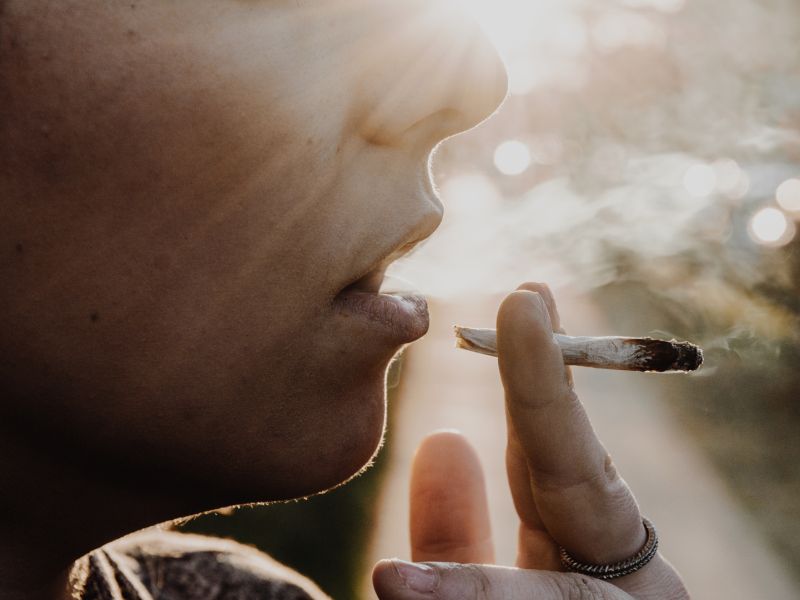
TUESDAY, March 19, 2019 — The jittery, delusional potheads of the old movie “Reefer Madness” have prompted eye rolls and chuckles over the years, but a new study argues that the cult classic might contain a kernel of truth.
Smoking pot every day could increase your risk of a psychotic break with reality, particularly if you have access to high-potency strains of marijuana, European researchers report.
As many as 1 in 5 newly diagnosed cases of psychosis might be linked to daily cannabis use, according to data gathered from 11 hospitals across Europe.
People who used pot on a daily basis were three times more likely to have a first-time diagnosis of psychosis, and five times more likely if they used high-potency marijuana every day, researchers said.
The new study “raises real concerns about the dangers posed by high-potency marijuana,” said Emily Feinstein, executive vice president and chief operating officer of the Center on Addiction.
“Over the past decade, there has been an increase in the availability of high-concentration THC products, for both medical and recreational use,” said Feinstein, who wasn’t involved with the study. “While there may still be questions about the nature of the link between daily use of high-potency marijuana and psychotic disorder, this study suggests that we should be monitoring this issue very closely and taking steps to protect the public’s health.”
But NORML Deputy Director Paul Armentano said it would be “premature at best, and sensational at worst” to conclude a causal relationship exists between marijuana use and psychiatric disorders.
Armentano noted that rates of psychosis and mental illness have remained largely static over the decades, even though marijuana use has waxed and waned in popularity.
“This fact undermines the theory that cannabis exposure is a direct cause of psychosis in otherwise non-predisposed subjects, and instead indicates that those most likely to express psychotic symptoms probably possess a predisposition to both cannabis use and psychosis,” Armentano said.
For the new study, researchers collected data on about 900 patients diagnosed with their first episode of psychosis at 11 hospitals in Europe between May 2010 and April 2015. They compared these patients with more than 1,200 random folks who’d never been diagnosed with psychosis.
Psychosis involves a loss of contact with reality, according to the U.S. National Institute on Mental Health (NIMH). The person might become delusional, or suffer from hallucinations.
The study reported on first-time psychotic episodes, and people can experience psychosis without ever being diagnosed with a long-term mental health condition, NIMH says. On the other hand, if a person suffers regular bouts of psychosis for at least six months, they are open to a potential diagnosis of schizophrenia.
These patients were typically “unwell enough to come to the attention of mental health services because of the level of distress associated with symptoms like hearing voices, or experiencing delusions such as believing to be in danger and at the center of a conspiracy,” explained lead author Dr. Marta Di Forti. She’s a research fellow with King’s College London’s Institute of Psychiatry, Psychology and Neuroscience.
Daily marijuana use was four times more likely among patients with first-episode psychosis, with nearly 30 percent saying they used pot daily compared with only about 7 percent of people in the control group.
High-potency cannabis use was twice as likely to be used among those diagnosed with psychosis, with about 37 percent saying they used strong pot, compared with 19 percent of healthy controls.
Use of high-potency pot, with a THC level over 10 percent, was a strong predictor of psychotic disorder in both Amsterdam and London, researchers found.
In those cities, strong pot is widely available. In the Netherlands, THC content can be as high as 67 percent, while 94 percent of highly potent, “skunk” pot in London averages 14 percent THC, the researchers said.
“In European cities where high-potency cannabis is widely available, a significant proportion of new cases of psychosis are associated with daily cannabis use and high-potency cannabis,” Di Forti said. “This proportion is as high as 30 percent in South London and 50 percent in Amsterdam.”
Across all 11 hospitals, about 20 percent of new cases of psychosis appeared to be linked to daily cannabis use, and about 12 percent linked to use of high-potency cannabis.
Di Forti concluded that marijuana users should “avoid high-potency types and daily use, and seek a doctor’s advice if concerned about experiencing psychotic symptoms.”
The findings were published March 19 in The Lancet Psychiatry journal.
Because this was an observational study, it can’t prove a direct cause-and-effect link between pot and psychosis, said Suzanne Gage, a psychologist with the University of Liverpool who wrote an editorial accompanying the study.
More studies using different designs “could help us to triangulate evidence and get a better idea of whether it’s truly a causal effect,” Gage said.
Despite his skepticism, Armentano allowed that “the concerns raised in this paper ought to be taken seriously, and they provide an argument in favor of better regulation of the plant so that it can be better kept out of the hands of young people and those who may be at higher risk for an adverse reaction.
“Maintaining cannabis prohibition, unfortunately, achieves neither result,” he concluded.
More information
The U.S. National Institute on Drug Abuse has more about pot use and mental disorders.

© 2019 HealthDay. All rights reserved.
Posted: March 2019
